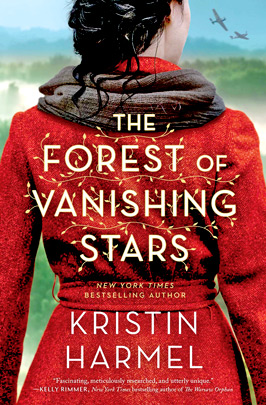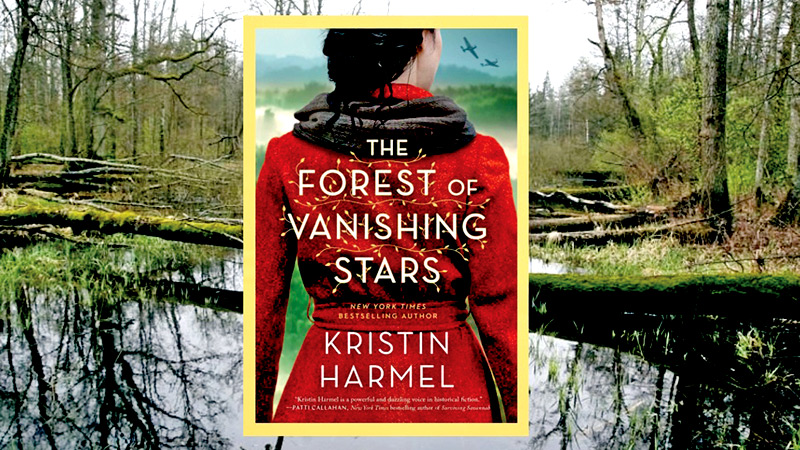New York Times bestselling author Kristin Harmel’s “The Forest of Vanishing Stars” is my very recent read. This Orlando based former reporter of ‘People magazine’ has been gaining the ground as a fiction writer within the community of fiction writers.
Harmel’s narrations on the aspect of war-time stories are of greater significance that shed light on the emotional conflicts, surrounded by war and peace negotiations of which the actual picture may remain ambiguous. Her plot in the book is focused on a group of Jewish refugees who flee from the brutality of Hitler’s Nazi regime by hiding in the last forest that remains in Poland.
 Yona, the protagonist of the story, is a young woman who was stolen from her crib by a Jewish woman. At the time of her abduction, Yona was barely two years; the initial chapters do not make a clear clarification with regard to this particular incident and the reader remains still inquisitive about the motive behind the elderly woman’s sheer act of toddler robbing.
Yona, the protagonist of the story, is a young woman who was stolen from her crib by a Jewish woman. At the time of her abduction, Yona was barely two years; the initial chapters do not make a clear clarification with regard to this particular incident and the reader remains still inquisitive about the motive behind the elderly woman’s sheer act of toddler robbing.
However, a deep dive into a further read indicates that the old Jewish woman is considerably rich with her versatility in relatively accurate forsaking of the future; she seems to have been influenced by an unusual mystic power through which she finds that Yona is an exception of a child of her age and has got a duty to perform a certain task; the woman begins her responsibility of teaching Yona of living a life by means of day today examples.
Meanwhile, the old woman deeply believes that with the fullest of time, Yona would do her part of extending her helping hand to the people who are in need of her help.
Education
In the thick forest, the old woman gives Yona with the so-called oddest form of education that generally differs from that of the accepted form of education that is offered to a child in the conservative school setup. This rather unique and specific form of education teaches Yona a variety of life skills; she learns survival methods, applied in a dense forest, experimenting with the art of being concerned about shelters of various kinds.
Learning the ways and means of gathering and preserving the food whilst getting aware of the medicinal significance of forest grown plants and herbs also takes equal attention. The other most highlighted aspect of learning is as to how self-defence becomes a matter of major concern.
The skill in speaking in many languages is another component on which the old woman gives her consideration; among so many, German, Russian and Polish languages take centre stage. Right at the very moment that Yona finishes her education, the old woman perishes.
This terrifying situation puts her into a state where she struggles to understand as to what was expected by the old woman; Yona by now is well evolved and encounters a large number of Jewish refugees, fleeing for their lives within the boundaries of the huge forest.
With her closely observed evaluation, Yona finds that these refugees are under the threat of getting killed, unless they change their ways of movement. This crucial situation reminds Yona of her entrusted mission, and she begins teaching them everything taught to her that can tackle the complexities in fleeing through a thicket without being caught by the enemy; this includes the strategies, applied whilst living off the land and staying hidden.
The survival aspect that the author brings out notably under extremely stiff circumstances of persistent fear and impending doom is beyond any doubt rather riveting. The sense of endured commitment that Yona puts into practice in saving the targeted lives of these refugees is a classification of selflessness and heroism which she carries within herself even when her life itself is at an enormous danger.
Even at the cost of her life, it is breathtaking to see that she is even willing to help this desperate group of refugees who are complete strangers. Another notable thing that runs through the story is the sincere eagerness that the refugees maintain towards their need of absorbing what is shared by Yona; they become genuinely committed to what she teaches them regarding their endeavour of not making themselves vulnerable to any attack driven by the Nazi army.
Eye opener
Refugees and Yona eventually get close to each other as if they were a family itself. Despite being battled by rather chaotic and treacherous circumstances, the deep bond that they struggle to maintain is incredibly unassuming. On the other hand, the book itself is an eye opener to the plight of the Jews who got tortured in Nazi concentration camps during the dark period of the Holocaust.
Made sensibly and painfully touching and moving by Hamel’s selection of characters as well as that of her remarkably outstanding way of storytelling, ‘The Forest of Vanishing Stars’ may occupy your bookshelf as an enduring fiction that deals with love, resilience, endurance, courage and human values.






